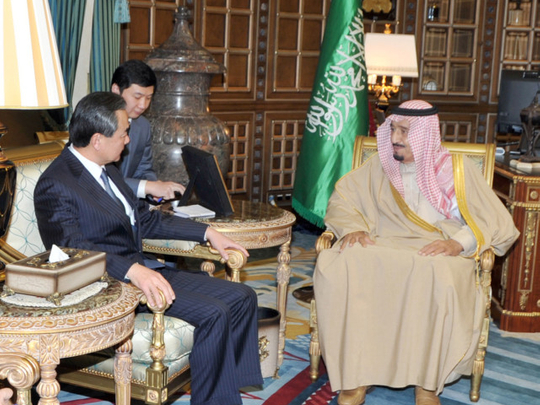
Beijing: Chinese Foreign Minister Wang Yi has said China would support Arab States in resolving regional issues, achieving development, safeguarding their legitimate rights and playing a role in regional and international affairs.
The Chinese government’s new policy towards Arab states can be summarised as “four supports”, said Wang in an interview with Al Jazeera, after concluding his Middle East visit. Excerpts from the interview were put on the foreign ministry website on Thursday.
The foreign minister said the “four supports” would consist China’s help to Arab states in resolving the region’s hotspot issues through political means; achieving a win-win and common development with China; playing a bigger role in regional and international affairs; and more effectively safeguarding their legitimate rights and interests, Chinese news agency Xinhua reported.
Wang Yi stressed that “China will play a role in the political field as well. China’s political role in the Middle East will only be enhanced, not diminished,” the Chinese ministry of foreign affairs website cited him as saying.
“This represents China’s most fundamental position, which also meets the aspiration and fundamental interests of the Arab countries and their peoples,” he said in the interview.
Wang concluded his Middle East visit to Palestine, Israel, Algeria, Morocco and Saudi Arabia on December 26, last year. This was his first visit to the Middle East region as the foreign minister of China.
The trip had three goals — to carry forward the relations of friendship, deepen existing cooperation, and promoting peace talks, Wang said.
“China is committed to carrying forward the traditional friendship. My Middle East trip has achieved this goal completely, as I have felt for myself the profound goodwill of the Arab states and their people for China,” Wang added.
China has worked hard to deepen its cooperation with the countries in the region for mutual benefit. Last year, bilateral trade reached nearly $300 billion (Dh1.1 trillion), with China becoming the top trading partner of many Arab states.
“China is ready to share its experience in high-speed rail development with any country and participate in national rail network programme of the region’s countries, thus benefiting these countries and their peoples,” he said.
With regard to many hotspot issues in the Middle East, Wang said one key purpose of his visit was to follow President Xi Jinping’s four-point proposal on the issue of Palestine. He also discussed the Syrian and the Iranian nuclear issues with the countries of this region.
Gulf-China relations expert Tim Noblock of the University of Exeter told Gulf News in a recent interview that as the US’ place among the Gulf region’s trade partners falls, China’s has been rising. The US has now become the Gulf states’ sixth largest trade partner.
As the US’ demand for Gulf oil falls with the shale revolution in that country, said Niblock, China’s demand is expected to rise.
China’s desire to play a bigger role in the region comes amid an American-Iranian detente that may end the three decade row between the two countries. Gulf states have expressed concern that the US may abandon its security and energy partnership with them as Iran comes out of the cold.
“A former Chinese ambassador to Iran [told me] that to China, Saudi Arabia is more important than Iran because China knows where [Saudi Arabia] stands...Sooner or later the US will patch up with Iran and China must not be in a position where it has put all its eggs in the basket of Iran. China needs to therefore have good relations with all Gulf states and it can be a bit more confident in its relationship with Saudi Arabia...”
— With inputs from IANS










